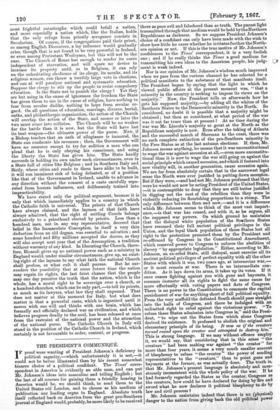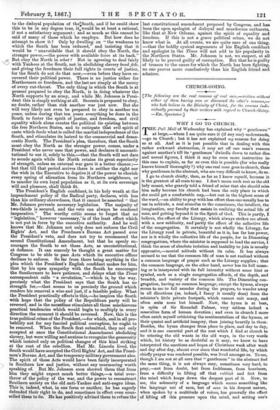THE PRESIDENT'S COMMUNIQUÉ.
IF proof were wanting of President Johnson's deficiency in political sagacity,—which unfortunately it is nok—it could not be better illustrated than by his recent somewhat bizarre choice of a political confidant. The Times' corre- spondent in America is evidently an able man, and can put Mr. Johnson's ideas into masculine and telling English ; but the last of all courses for gaining them a friendly hearing in America would be, we should think, to send them to the United States vid London, and to choose as his medium of publication our leading organ in England. Absolute truth itself reflected back on America from the great pro-Southern journal of England would, probably, be more likely to be received there as pure evil and falsehood than as truth. The purest light transmitted through that medium would be held bythe Northern Republicans as darkness. So we suppose President Johnson's choice of a confidant can only have been made with the wish to show how little he cares whether he irritates further the North- ern opinion or not. If this is the true motive of Mr. Johnson's confidences to the Times' correspondent, it is a very foolish one ; and if he really thinks the Times a good medium for transmitting his own ideas to the American people, his judg- ment is weak indeed.
Nor is our opinion of Mr. Johnson's wisdom much improved when we pass from the curious channel he has selected for a political manifesto to the substance of that manifesto itself. The President began by saying that the light in which he viewed public affairs at the present moment was, " that a minority in the country is seeking to impose its views on the majority." Now, the President tells us afterwards how he gets his supposed majority,—by adding all the whites of the Southern States to the Democratic minority in the North. So considered, no doubt it is possible that a majority might be obtained ; but then so considered, at what period of the war was it not far truer than at present V At no time during the war was Mr. Lincoln's majority so great at the North as the Republican majority is now. Even after the taking of Atlanta and the successful march of Sherman to the coast, there was no such complete extinction of the pro-Southern minority in the Free States as at the last autumn elections. If, then, Mr. Johnson means anything, he means that it was unconstitutional to wage the war against secession at all,—even more unconstitu- tional than it is now to wage the war still going on against the social principle which caused secession, and which if fostered into new vitality will, in another generation, cause secession again. We are far from absolutely certain that in the narrowest legal sense the North were ever justified in patting down secession. But if they were,—and had not Mr. Johnson professed that they were he would not now be acting President of the United States, it is contemptible to deny that they are still better justified in digging out the root of the rebellion than they were in violently reducing its flourishing proportions to a stump. The only difference between then and now,—and it is a difference which Mr. Johnson seems to think of the most vast import- ance,—is that war has ceased, and with it, as he argues, all the supposed war powers. On which ground he maintains that the disloyal white population of the Southern States have resumed their full ancient political privileges in the Union, and the loyal black population of those States lost all right to the protection promised them by the President and re-affirmed by Congress in the Constitutional Amendment, which reserved power to Congress to enforce the abolition of slavery " by appropriate legislation." Either, according to Mr. Johnson, an ex-rebel State, still disloyal, must exercise all its ancient political privileges of perfect equality with all the other States with which it was, two years ago, at internecine war,— or it must remain at war. There is no intermediate con- dition. As it lays down its arms, it takes up its votes. If it once ceases fighting against you with guns and bayonets, it resumes instanter all its rights to fight the same cause far more effectually with voting papers and Acts of Congress. There is no power in the Constitution to commute the capital punishment of war for anything short of full political equality. From the very scaffold the defeated South should pass straight into the halls of Congress, and there be indulged with an unlimited right to cabal against the victorious power. "To refuse these States admission into Congress is," said the Presi- dent, " to wipe out the States from which alone Congress derived its existence. It professed to abolish the original and elementary principle of its being. It was as if the creature turned round upon the creator and attempted to destroy him." This is strong language. If we may without offence employ it, we would say, that considering that in this sense " the creature " had been making war against " the creator" for more than four years, it seems a very much smaller amount of blasphemy to refuse " the creator the power of sending representatives to the " creature," than to point guns and bayonets at the former, as was actually done. The truth is, that Mr. Johnson's present language is absolutely and mon- strously inconsistent with the whole policy of the war. If he had formerly regarded the States as the creator, Congress as the creature, how could he have declared for doing by fire and sword what he now declares it political blasphemy to do by law and civil process Mr. Johnson maintains indeed that there is no (physical) danger to the nation from giving back the old political power to the disloyal population of theLSouth, and if he could show this to be in any degree true, it, would be at least a rational, if not a satisfactory argument ; and as much as this cannot be said of many of those which he employs. Bat how does he attempt to show it Only by dwelling on " the weakness to which the South has been reduced," and insisting that it would be " unavoidable that it should obey the North, the stronger power,—the power with available force at its back."
A. But obey the North in what ? Not in agreeing to deal fairly with Yankees at the South, not in abolishing slavery bond fide, and giving the freedmen their full rights in courts of justice, for the South do not do that now,—even before they have re- covered their political power. There is no justice either for Northerners or freedmen, and the last are simply at the mercy of every cut-throat. The only thing in which the South is at present prepared to obey the North, is in doing whatever the North supports by an army, and while Mr. Johnson is Presi- dent this is simply nothing at all. Secessia is prepared to obey, no doubt, rather than risk another war just now. But she will very likely not even be prepared to obey in another ten years, unless during that ten years everything be done in the South to foster the spirit of justice, and freedom, and civil equality which alone creates the political tie existing between the free Northern States, and to extirpate that evil spirit of caste which feeds what is called the martial independence of the South, and stimulates its hatred to the commercial and demo- cratic North. The President's plea, therefore, that the South must obey the North as the stronger power, comes, under a President who never uses that power, and declares it unconsti- tutional to use it, solely to this,—that the South will not dare to secede again while the North retains its great superiority of strength, unless an external war gave it a better chance ;- but that till that period arrives there is neither the right nor the wish in the Executive to deprive it of the power to cherish every spring of alienation from its Northern neighbours, or to murder its own loyal population as it, at its own sovereign will and pleasure, shall think fit.
The President's English confidant, in his holy wrath at the impeachment policy of the Radical party, declares, with less than his ordinary shrewdness, that it cannot be asserted " that Mr. Johnson prevents necessary legislation. The majority of two-thirds is secured, and the veto can always be rendered inoperative." The worthy critic seems to forget that no "legislation," however necessary,' is of the least effect which is not put in force by the executive authority. And he well knows that Mr. Johnson not only does not enforce the Civil Rights' Act, and the Freedmen's Bureau Act passed over the President's veto, and does not try to recommend the second Constitutional Amendment, but that he openly en- courages the South to set these Acts, as unconstitutional, at defiance. It can scarcely be thought a great matter for Congress to be able to pass Acts which its executive officer declines to enforce. So far from there being anything in the plea which the President's English confidant makes for him, that by his open sympathy with the South he encourages the Southerners to have patience, and delays what the Times correspondent calls " a revolution,"—which is, by the way, precisely what the President says that the South has no strength for,—that seems to us precisely the ground which renders his removal a wise and just, if a feasible policy. What the President practically effects is this,—he inspires the South with hope that the policy of the Republican party will be reversed, and in the meantime stimulates all those mischievous practical tendencies which would begin to multiply in every direction the moment it should be reversed. Now, this is the true political crime of the President,—for which, and in all pro- bability not for any fancied political corruption, he ought to be removed. When the South first submitted, they not only accepted at once the Constitutional Amendment abolishing slavery, but were willing and anxious to recognize the generosity which insisted only on political changes of this kind striking at the root of the rebellion. Had Mr. Lincoln lived, the South would have accepted the Civil Rights' Act, and the Freed- men's Bureau Act, and the temporary military government also. The spirit of these Acts would have been fairly incorporated in Southern law and justice, without any murmuring worth speaking of. But Mr. Johnson soon showed them that from him they might expect much better things,—a total over- throw of the policy of the war, and the power to reconstruct Southern society on the old anti-Yankee and anti-negro ideas. This is, indeed, what, in one form or another, he has eagerly defended their right to do, and sometimes in effect even coun- selled them to do. He has positively advised them to refuse the last constitutional amendment proposed by Congress, and has been the open apologist of disloyal and murderous outbursts, like that at New Orleans, against the spirit of equality and freedom. If this is not a grave political crime, we do not know what is. At all events, we are quite sure of one thing, —that the boldly cynical arguments of his English confidant and apologist in the Times will not add to his popularity in the Northern States. Mr. Johnson is not, we suspect, at all likely to be proved guilty of corruption. But that he is guilty of treason to the cause for which the North has been fighting, no one proves more conclusively than his English friend and, admirer.



































 Previous page
Previous page